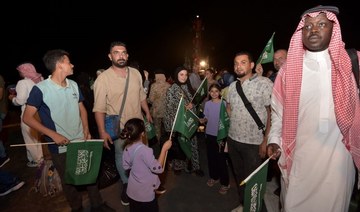CAIRO: Sudanese families were massing Wednesday at a border crossing with Egypt and at a port city on the Red Sea, desperately trying to escape their country’s violence and sometimes waiting for days with little food or shelter, witnesses said.
In the capital, Khartoum, the intensity of fighting eased on the second day of a three-day truce, and the military said it had “initially accepted” a diplomatic initiative to extend the current cease-fire for another three days after it expires Thursday.
The initiative, brokered by the eight-nation East Africa trade bloc known as the Intergovernmental Authority on Development, or IGAD, would also include direct negotiations between the military and the Rapid Support Forces, the paramilitary group it has been battling since Apr. 15.
There was no immediate comment from the RSF on the initiative, which, if accepted by both sides, would mark a major breakthrough in more than a week of intense international diplomacy. The two rivals, army chief Gen. Abdel Fattah Burhan and RSF commander Gen. Mohammed Hamdan Dagalo, have until now seemed determined to vanquish the other.
Taking advantage of relative calm, many residents in Khartoum and the neighboring city of Omdurman emerged from their homes to seek food and water, lining up at bakeries or grocery stores, after days of being trapped inside by the fighting between the army and a rival paramilitary group. Some inspected shops or homes that had been destroyed or looted.
“There is a sense of calm in my area and neighborhoods,” said Mahasen Ali, a tea vendor who lives in Khartoum’s southern neighborhood of May. “But all are afraid of what’s next.”
Still, gunfire and explosions could be heard in the city, though residents said clashes were in more limited pockets, mainly around the military’s headquarters and the Republican Palace in central Khartoum and around bases in Omdurman across the Nile River.
With the future of any truce uncertain, many took the opportunity to join the tens of thousands who have streamed out of the capital in recent days, trying to get out of the crossfire between the forces of Sudan’s two top generals.
Food has grown more difficult to obtain, and electricity is cut off across much of the capital and other cities. Multiple aid agencies have had to suspend operations, a heavy blow in a country where a third of the population of 46 million relies on humanitarian assistance.
The UN Office for the Coordination of Humanitarian Affairs said only one in four hospitals in the capital is fully functional, and that the fighting has disrupted assistance to 50,000 children who are acutely malnourished.
Many Sudanese fear the two sides will escalate their battle once the international evacuations of foreigners that began Sunday is completed. The British government, whose airlift is one of the last still ongoing, said it has evacuated around 300 people on flights out and plans four more Wednesday, promising to keep going as long as possible.
Large numbers of people have meanwhile been making the exhausting daylong drive across the desert to access points out of the country — to the city of Port Sudan on the eastern Red Sea coast and to the Arqin crossing into Egypt at the northern border.
Crowds of Sudanese and foreigners also waited in Port Sudan, trying to register for a ferry to Saudi Arabia. Dallia Abdelmoniem, a Sudanese political commentator, said she and her family arrived Monday and have been trying to get a spot.
She and some of her extended family, mostly women and children, took a 26-hour bus journey to reach the port, during which they passed military checkpoints and small villages where people offered cold hibiscus juice and water to “Khartoum travelers.”
“These folk have very little, but they offered every single passenger on all these buses and trucks something to make their journey better,” she said.
At the Arqin crossing, families have been spending their nights outside in the desert, waiting to be let in to Egypt. Buses were lining up at the crossing.
“It’s a mess — long lines of elderly people, patients, women and children waiting in miserable conditions,” said Moaz Al-Ser, a Sudanese teacher who arrived along with his wife and three children at the border a day earlier.
Tens of thousands of Khartoum residents have also fled to neighboring provinces or even into already existing displacement and refugee camps within Sudan that house victims of past conflicts.
At least 512 people, including civilians and combatants, have been killed since the fighting erupted on Apr. 15, with another 4,200 wounded, the Sudanese Health Ministry said. The Doctors’ Syndicate, which tracks civilian casualties, said at least 295 civilians have been killed and 1,790 wounded.
The 72-hour cease-fire announced by US Secretary of State Antony Blinken was to last until late Thursday. Many fear that fighting will only escalate once evacuations of foreigners, which appeared to be in their last stages, are completed.
But a senior British military officer said the UK evacuation operation could continue regardless of the cease-fire. Brig. Dan Reeve said conditions at the Wadi Saeedna airfield near Khartoum are “calm” and that the Sudanese armed forces have “good control” of the surrounding area.
Cyprus’ Foreign Minister Constantinos Kombos said five flights from Sudan arrived Wednesday, with a total of 391 British nationals aboard.
A series of short cease-fires over the past week have either failed outright or brought only intermittent lulls that allowed evacuations of hundreds of foreigners by air and land.
UN Secretary-General Antonio Guterres warned that the conflict is not only putting Sudan’s future at risk, “it is lighting a fuse that could detonate across borders, causing immense suffering for years, and setting development back by decades.”
Guterres cited reports of armed clashes across the country, with people fleeing their homes in Blue Nile and North Kordofan states and across Western Darfur as well. Joyce Msuya, the assistant secretary-general for humanitarian affairs, told the Security Council “there have been numerous reports of sexual and gender-based violence.”
Msuya said the UN has received reports “of tens of thousands of people arriving in the Central African Republic, Chad, Egypt, Ethiopia, and South Sudan.”
In a separate development, Dr. Mike Ryan, emergencies chief at the World Health Organization, appeared to walk back concerns expressed a day earlier by the WHO representative in Sudan over fighters taking over a laboratory where pathogens are stored, including polio, measles and cholera. Speaking to reporters in Geneva, Ryan said the main risk of exposure was to the fighters themselves.
Burhan and Dagalo rose to power after a popular uprising in 2019 prompted the generals to remove Sudan’s longtime autocratic ruler Omar Al-Bashir. Sudanese since have been trying to bring a transition to democratic rule, but in 2021 Burhan and Dagalo joined forces in a coup that purged civilian leaders. They fell out this month over a new rough plan to re-introduce civilian rule.
Both the military and the RSF have a long history of brutalizing activists and protesters as well as other rights abuses.
Also on Wednesday, the military said Al-Bashir was being held in a military-run hospital, giving its first official statement on his location since the fighting erupted. An attack on the prison where Al-Bashir and many of his former officials had been held raised questions over his whereabouts.
In a statement, the military said Al-Bashir and other former officials had been moved to the military-run Aliyaa hospital before clashes broke out across the country. Al-Bashir is wanted by the International Criminal Court on charges of genocide, crimes against humanity and war crimes related to the Darfur conflict in the 2000s.
Sudanese crowd at borders to escape amid shaky truce
https://arab.news/6nmvr
Sudanese crowd at borders to escape amid shaky truce

- The fighting Sudan Armed Forces and paramilitary Rapid Support Forces has turned residential areas into battlefields
Iran to send experts to ally Venezuela to help with medical accelerators

- “Venezuela has a number of accelerators in its hospitals that have been stopped due to the embargo,” the message said
CARACAS: Iran on Saturday said it will send experts to its ally Venezuela to help with medical accelerators in hospitals it said had been stopped due to Western sanctions.
Venezuela requested Iran’s help, according to a message on the social media platform X by the Iranian government attributed to the head of the Atomic Energy Organization of Iran.
“Venezuela has a number of accelerators in its hospitals that have been stopped due to the embargo,” the message said.
Medical accelerators are used in radiation treatments for cancer patients.
Venezuela is also an ally of Russia and China.
The return of US sanctions on Venezuela’s oil industry has made its alliance with Iran critical to keeping its lagging energy sector afloat. Washington last year temporarily relaxed sanctions on Venezuela’s promise to allow a competitive presidential election. The US now says only some conditions were met.
Three Syrians missing after cargo ship sinks off Romania

- Eight sailors were rescued by one of the nearby commercial vessels, while the search for the other three, “all of Syrian nationality,” was continuing, the statement said
BUCHAREST: Romanian rescue teams on Saturday were scouring the Black Sea for three Syrian sailors who went missing when their cargo ship sank off the coast, the naval authority said.
The Mohammed Z sank with 11 crew on board, 26 nautical miles off the Romanian town of Sfantu Gheorghe in the Danube delta in the Black Sea on Saturday morning, officials said in a statement.
The ship sailing under the Tanzanian flag was carrying nine Syrian and two Egyptian nationals, it said.
After receiving an alert at “around 4:00am,” naval authorities and border police were dispatched, with two nearby commercial vessels also joining the search and rescue operation.
Eight sailors were rescued by one of the nearby commercial vessels, while the search for the other three, “all of Syrian nationality,” was continuing, the statement said.
The cause of the accident was unclear.
According to the specialist website Marine Traffic, the ship departed from the Turkish port of Mersin and was heading to the Romanian port of Sulina.
Since the start of Russia’s war in Ukraine, drifting sea mines have posed a constant threat for ships in the Black Sea, with countries bordering it doubling down on demining efforts.
Ensuring safe passage through the Black Sea has gained particular importance since Romania’s Danube ports became hubs for the transit of grain following the Russian blockade of Ukraine’s ports.
Iraq parliament fails to elect a speaker

- A coalition of three Sunni blocs backed Issawi, while Mashhadani, who served as Iraq’s first speaker following the adoption of the 2005 constitution, received the support of the former speaker Mohamed Al-Halbussi’s sizeable bloc
BAGHDAD: Iraq’s lawmakers failed to elect a speaker on Saturday as neither of the two main candidates secured a majority during a tense session of parliament.
It is the latest in a series of failed attempts to replace the former head of parliament who was dismissed in November, with political bickering and divisions between key Sunni parties derailing every attempt so far.
Saturday’s vote was the closest yet to selecting a new head of the 329-member parliament, with 311 lawmakers showing up for the session and the leading candidate falling just seven votes short.
The parliament’s media office announced that 137 lawmakers chose Mahmoud Al-Mashhadani, the oldest MP, while 158 picked Salem Al-Issawi.
However, candidates require at least 165 votes to win.
Many lawmakers did not return for a second attempt on Saturday, with local media sharing videos of a brief brawl between MPs and reporting that at least one of them was injured.
The parliament’s media office then announced that the session had been adjourned.
Iraq, a mosaic of different ethnic and religious groups, is governed by complex power-sharing arrangements.
The largely ceremonial role of president traditionally goes to a Kurd, that of prime minister to a Shiite, while the speaker of parliament is usually Sunni.
But parliament is dominated by a coalition of pro-Iran Shiite parties, reflecting the country’s largest religious group.
A coalition of three Sunni blocs backed Issawi, while Mashhadani, who served as Iraq’s first speaker following the adoption of the 2005 constitution, received the support of the former speaker Mohamed Al-Halbussi’s sizeable bloc.
The new speaker will replace Halbussi, the influential politician dismissed by Iraq’s top court in November last year after a lawmaker accused him of forging a resignation letter.
Halbussi had been the country’s highest-ranking Sunni official since he first became a speaker in 2018.
The new speaker’s stint will not last long with the general election due in 2025.
Libyan armed groups clash near capital Tripoli

- Libya is divided between the UN-recognized Tripoli-based government and a rival administration in the country’s east
TRIPOLI: Clashes between Libyan armed groups broke out on Friday night in the city of Zawiya, some 40 kilometers west of the capital Tripoli, a security official told AFP.
An official at the city’s security directorate told AFP the clashes were ongoing but “intermittent” on Saturday.
“The southern areas of the city of Zawiya have been witnessing clashes between armed groups since last night,” the official said.
Libya is still struggling to recover from years of war and chaos after the 2011 overthrow of longtime dictator Muammar Qaddafi.
On Saturday morning, schools in Zawiya were suspended as some roads leading to the city were shut down amid a “casual” exchange of fire between the groups, the official said.
Media reports said the fighting left casualties, but authorities in Tripoli have yet to confirm any.
The Tripoli-based health ministry said in a statement it was working to evacuate parts of the city and taking injured people to hospitals.
The Libyan Red Crescent said it had evacuated some families from areas affected by the fights.
Authorities have not disclosed the reasons behind the fight.
Videos shared since Friday night on social media, which AFP could not verify, showed armed men in SUVs firing heavily at other armed groups.
Other videos showed smoke rising from parts of the city.
Although relative calm has returned to the oil-rich country in the past few years, clashes periodically occur between its myriad armed groups.
Last month, clashes broke out in the capital Tripoli, sparking panic among locals who were celebrating the end of the Muslim fasting month of Ramadan.
In August 2023, Tripoli’s worst armed clashes in a year left 55 people dead when two powerful groups fought.
Libya is divided between the UN-recognized Tripoli-based government and a rival administration in the country’s east.
How women and girls in war-torn Gaza are coping with water, sanitation and hygiene collapse

- UN Women has described ongoing Israel offensive as a “war on women” with at least 10,000 female deaths since last October
- Deprived of access to adequate services, more than 1 million women and girls face daily challenges and serious health risks
LONDON: Deprived of adequate access to water, sanitation, and hygiene services, Palestinian women and girls in Gaza are bearing the brunt of the prolonged and deepening humanitarian emergency caused Israel’s ongoing military offensive.
With no resolution to the conflict between Israel and Hamas in sight, more than a million displaced women and girls in the embattled Palestinian enclave continue to endure daily challenges in increasingly dire conditions.
UN Women has described the Israeli military operation in Gaza, which began in the wake of the Oct. 7 Hamas-led attack on southern Israel, as a “war on women,” with at least 10,000 killed since the start of the conflict — among them more than 6,000 mothers.
Those figures, published in April, are now likely far higher as Israel expands its operation and bombing raids into eastern Rafah — Gaza’s southernmost city, now home to some 1.4 million displaced Palestinians.

According to UN figures, this latest operation has forced an estimated 150,000 Palestinians to flee central and northern Rafah.
While the biggest risk to women and girls in Gaza is injury or death under Israeli bombardment, “the unhygienic conditions and lack of water in Gaza are also having a very negative impact on women and girls’ health and dignity,” Fikr Shalltoot, the Gaza programs director at Medical Aid for Palestinians, told Arab News.
Israel denies deliberately targeting civilian infrastructure, accusing Hamas of using residential areas for cover.
As summer approaches, soaring temperatures worsen the spread of communicable diseases caused by a lack of hygiene facilities, water, and access to proper food. The heat itself is also a significant danger to children and the elderly.
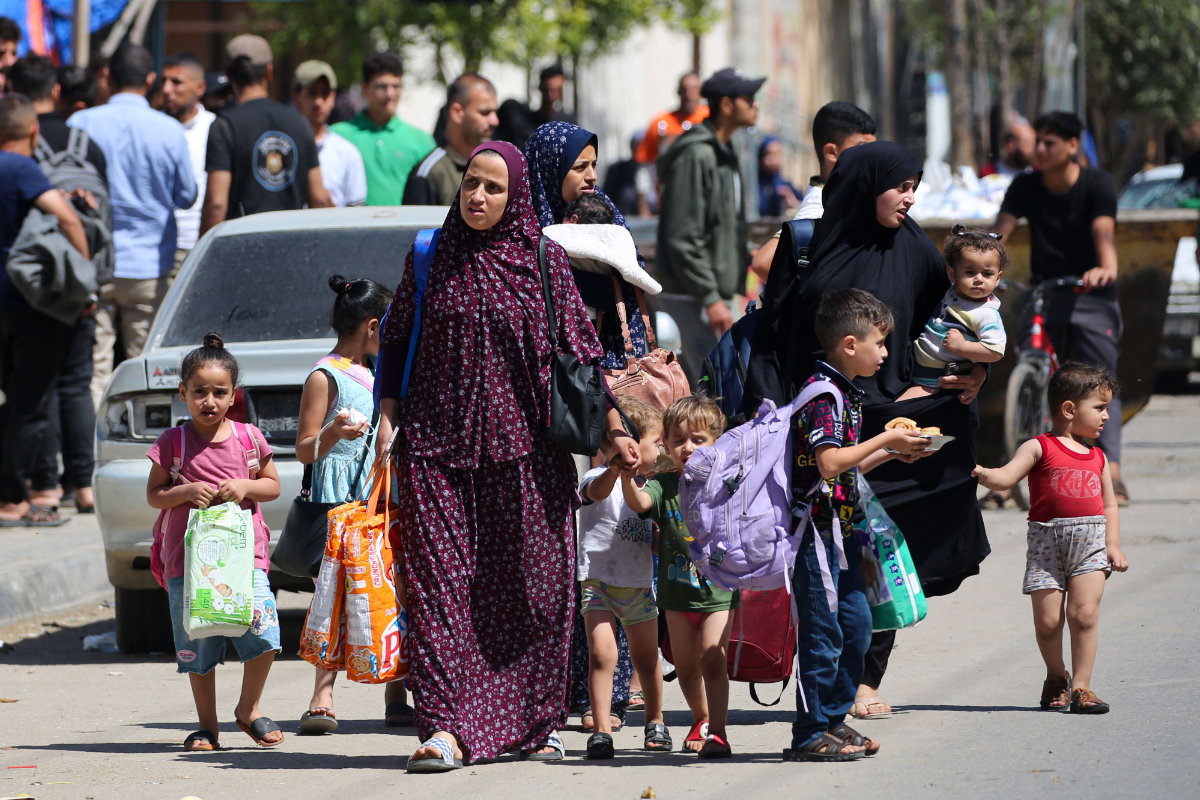
“During a recent heatwave, a 5-year-old girl tragically died in her tent due to extreme heat,” Shalltoot said.
Analysis of satellite imagery by BBC Verify found that the Israeli operation in Gaza has damaged or destroyed more than half (53 percent) of the territory’s vital water and sanitation facilities.
The analysis, based on images acquired in March and April, also confirmed that four of the six wastewater treatment plants in Gaza have been damaged or destroyed. These facilities were critical to preventing sewage buildup.
Fidaa Al-Araj, Oxfam’s food security, cash, and protection coordinator in Gaza, said the water, sanitation, and hygiene situation facing women and girls in the enclave was “challenging,” leaving them unable to access clean toilets or private shower spaces.
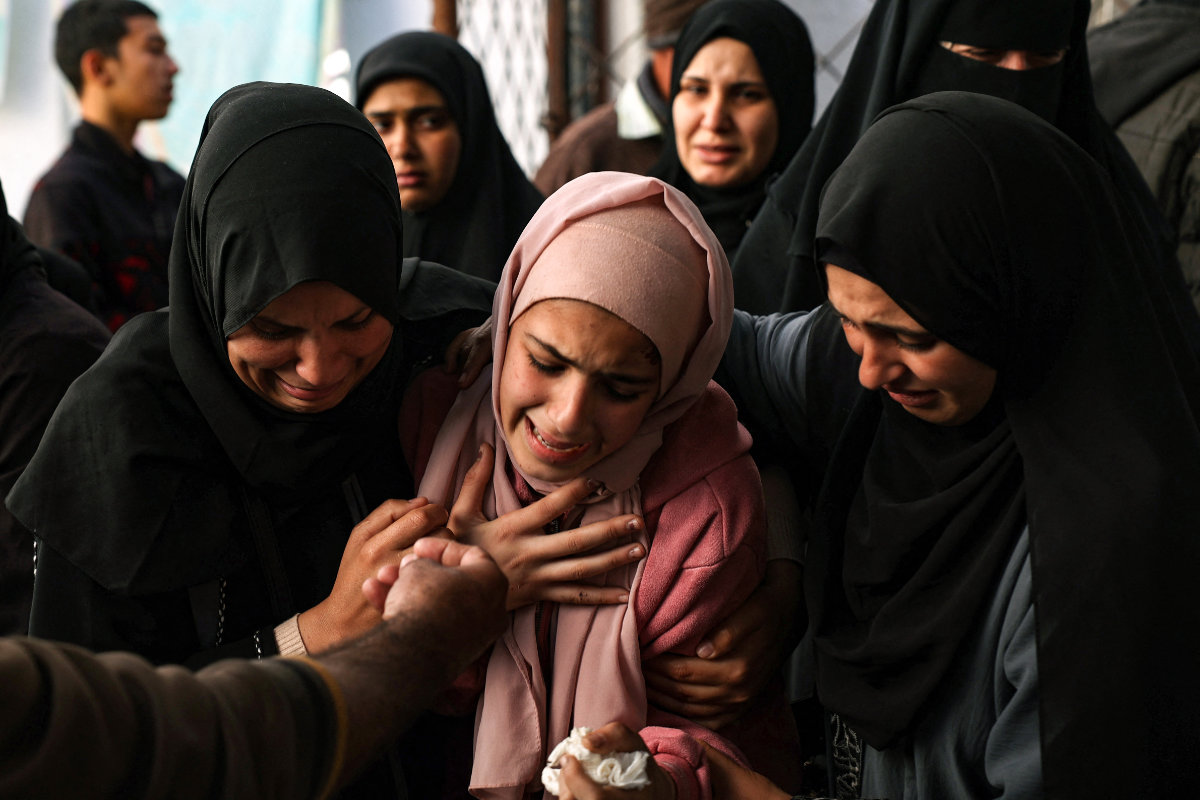
“Having been displaced into camps or even in a host community, the numbers of people, of internally displaced persons, are very, very high,” Al-Araj told Arab News. “So, there is (overcrowding), there are many difficulties in having access to toilets, bathrooms, showers.”
She added: “Even if you have the facilities, and even if by any stretch they are enough for the IDPs residing in any given space, there is the issue of lack of running water to supply those facilities and to have them up and running all the time.
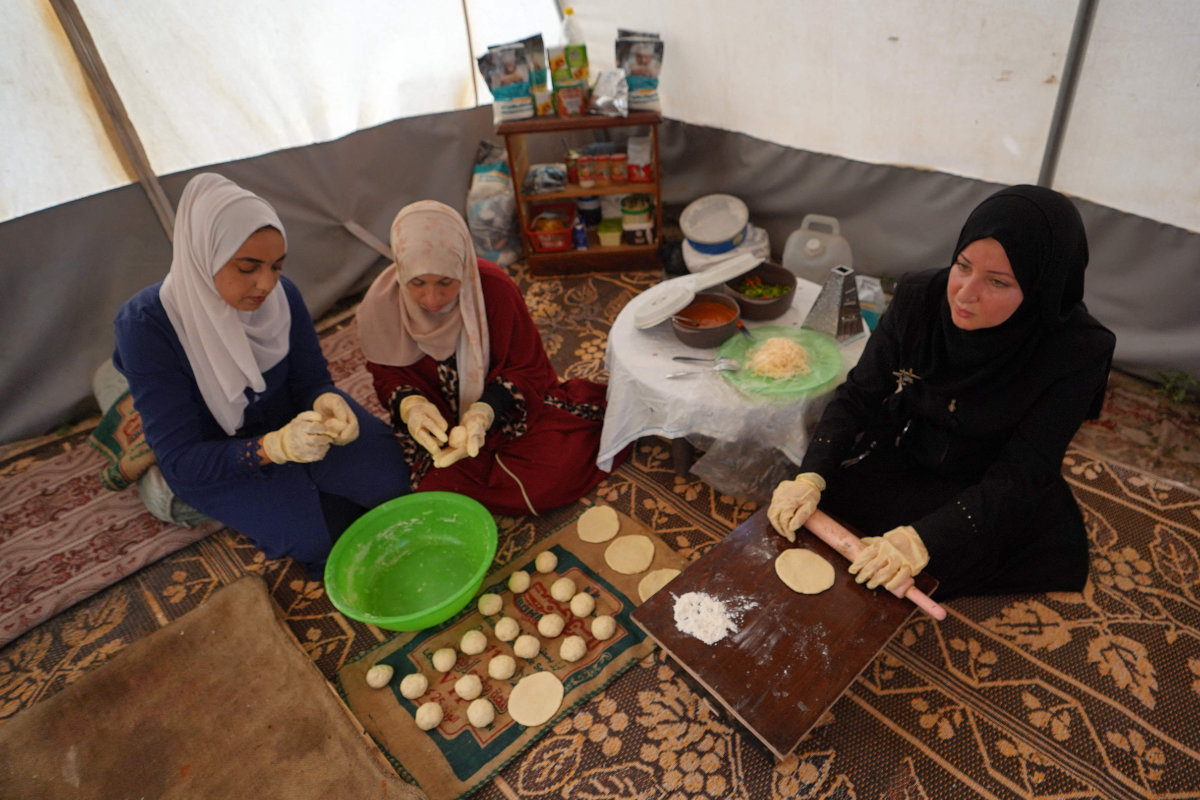
“So, the hygiene conditions are very compromised, to say the least. When it comes to women and girls, there are issues of privacy, which is completely lacking.”
Where washrooms are present, people have “to wait in line with all sorts of people, even strangers, men and women, just to use the toilet. You have people banging on the door of the toilet while you’re in there, asking you to hurry up because the line is still very long.”
INNUMBERS
• 700,000 Women and girls now hosted in Rafah who have nowhere else to go.
• 93% Women surveyed who feel unsafe in their own homes or in displacement.
• 6/10 Women who reported complications in pregnancy since Oct. 7.
Source: UN Women
This also makes management of menstruation especially challenging, as women and girls “endure longer hours without changing a pad, without washing,” Al-Araj added.
According to UN figures, there are more than 690,000 menstruating women and adolescent girls in the Gaza Strip. But aid agencies, which have had very limited access to the enclave due to the Israeli blockade, have been unable to meet the high demand for hygiene kits.
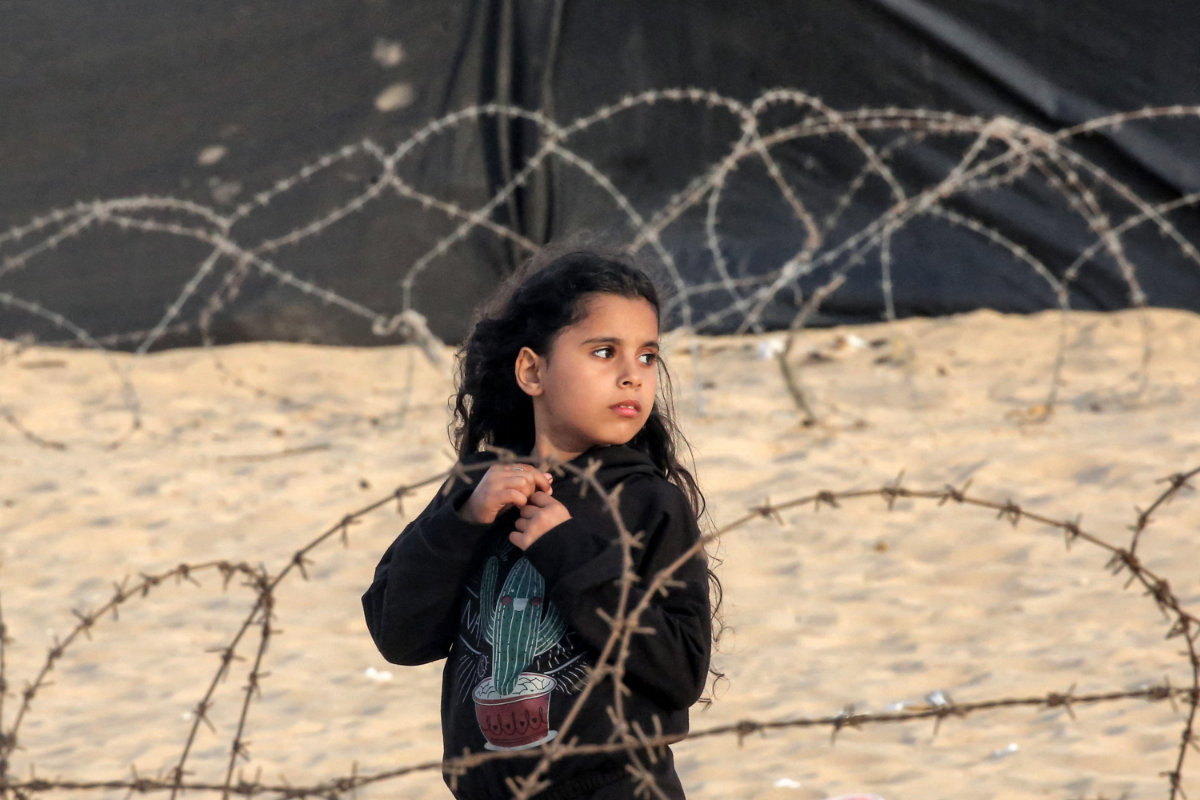
And since Israel took control of the Palestinian side of the Rafah border crossing on May 7 and closed the nearby Kerem Shalom crossing, the already limited flow of commercial goods and humanitarian aid has been further strangulated.
MAP’s Shalltoot confirmed that women’s sanitary products were “scarce in the local market,” highlighting that this has had “a psychological and physical health impact on women and girls.”
She said: “They resort to homemade, makeshift alternatives, which negatively impact their health by putting them at risk of reproductive and urinary tract infections and protection-related risks.
“This also negatively impacts their psychological well-being, anxiety and insecurity.”
Even the simple act of taking a shower has been almost impossible for women in Gaza for several months.
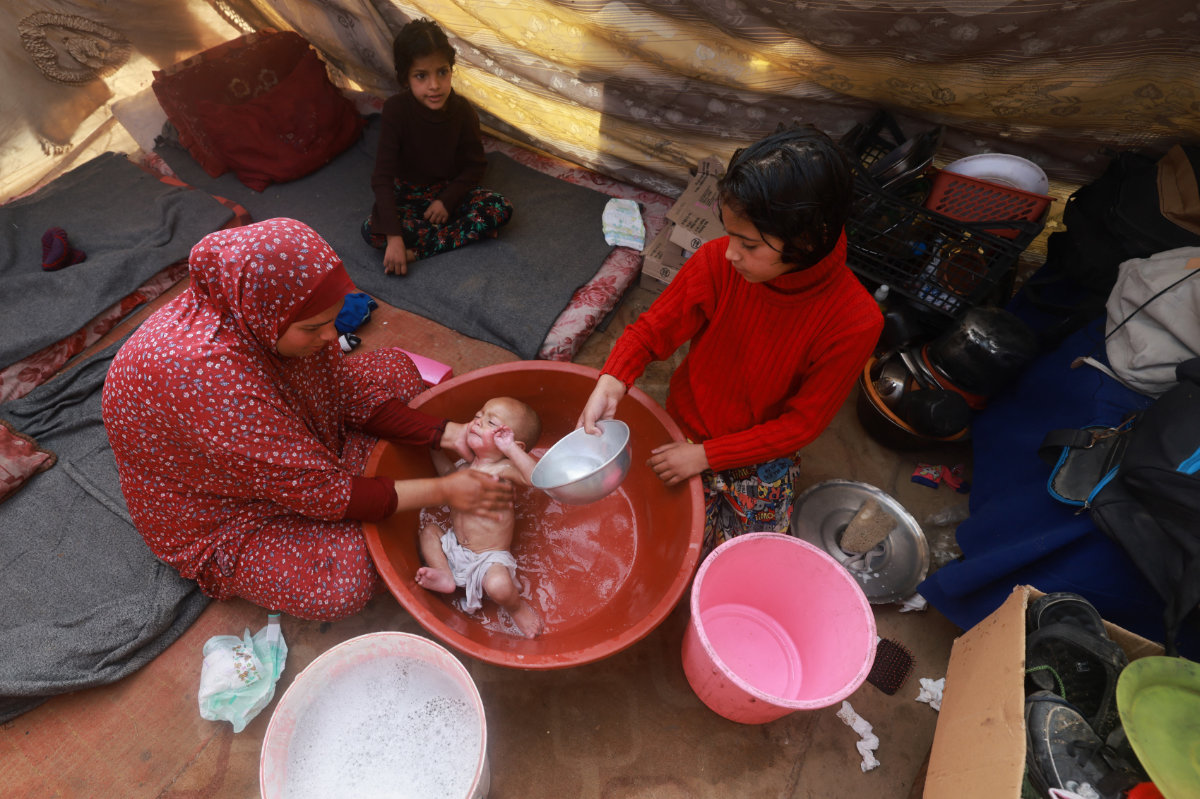
“It’s very difficult to find a spot designated to take showers, and if it’s there, it’s very difficult to have water,” Oxfam’s Al-Araj said. “And if the water is there, it’s very difficult to find time to take an adequate shower.”
She added: “As a woman and as a mother of girls, I’ve been through all of this. To overcome these circumstances, you space out the shower times, so you take a shower when it’s absolutely needed.
“Sometimes you could spend a couple of weeks or even more without taking a shower.”
The aid agency Medecins Sans Frontieres told the BBC that the destruction of water, sanitation and hygiene facilities has led to “disastrous health consequences for the population,” notably a significant rise in gastric complaints in Rafah.
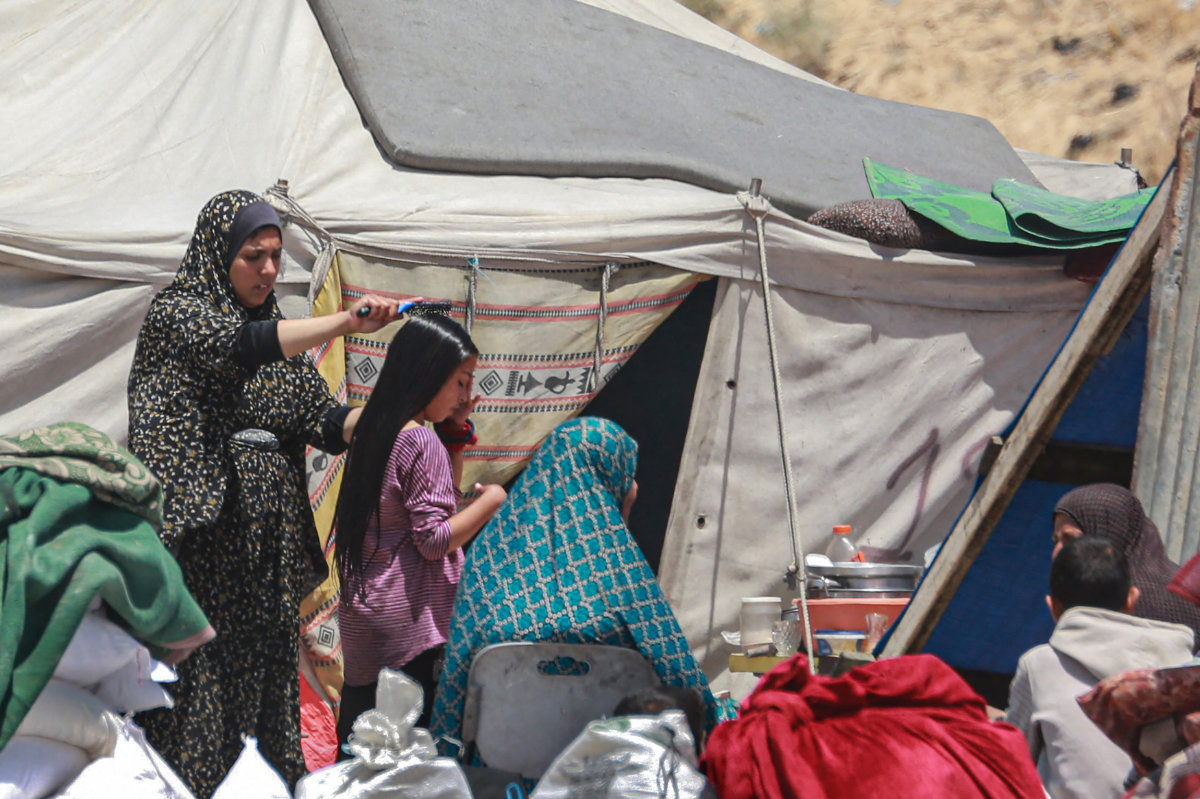
Contaminated water has also led to a spike in hepatitis A cases, with women and girls facing a heightened risk of exposure to the disease due to their traditional domestic responsibilities and caring for the sick, according to UN Women’s April gender alert report.
The report, titled “Scarcity and Fear,” highlighted that the lack of adequate and dignified facilities also exposes women and girls to reproductive and urinary tract infections.
“This situation could develop into dangerous or concerning health conditions for the women and girls, and I’m really sorry to say that it’s not given priority,” said Al-Araj.
“The heightening demand on the time, resources, and capacity of the medical facilities and staff makes prioritizing women’s issues or girls’ issues very difficult.”
Moreover, there are no quick fixes. Even if sufficient aid is permitted to enter Gaza, facilities need to be carefully planned in order to meet the necessary standards of privacy, cleanliness, and safety.
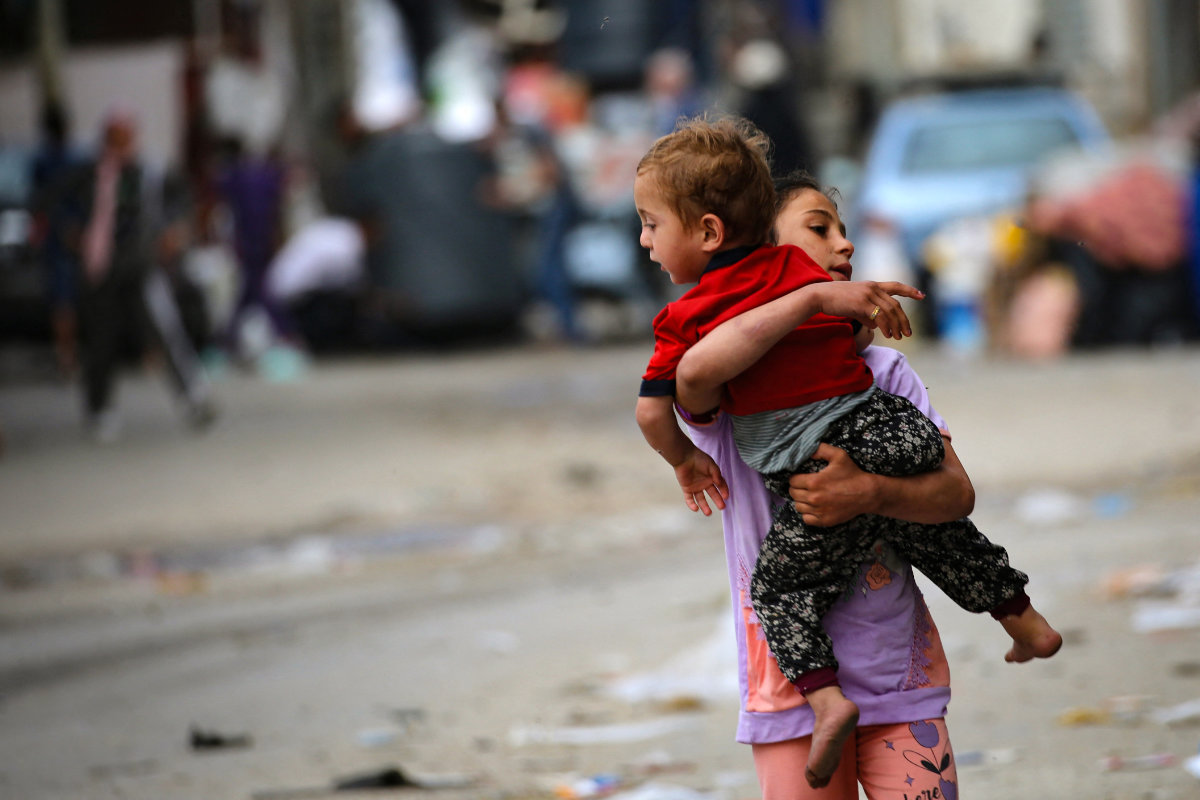
“It’s not enough to build a shower or a toilet,” said Al-Araj. “It’s not enough to provide it with water and that’s it. You have to think of the site … Is it safe for women and girls, is it accessible at all times … is it targeted maybe by different threats?
“You also have to think about the supplies. You don’t give a hygiene kit or a dignity kit once, for example, and that’s it, your work is done. You need to regularly provide those kinds of kits.”
Al-Araj also emphasized the need for “complementary services,” including extending responses “to enhancing access to sexual and reproductive health care system.
“I can only wish that the aftereffects of all of this wouldn’t linger for long or have irreversible results.”





